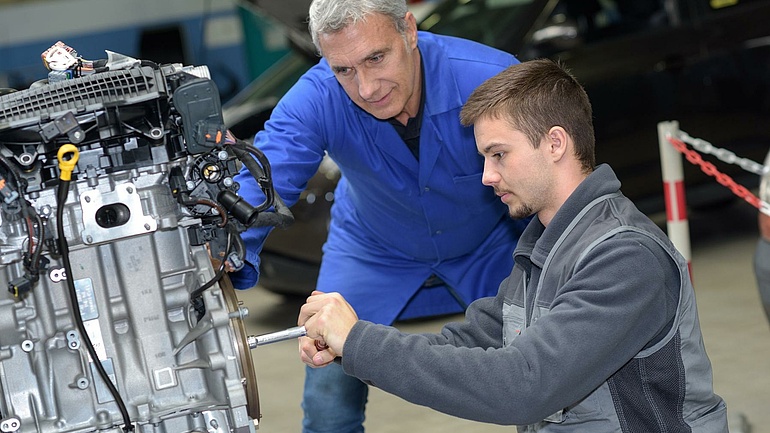Vocational Education and Training in Germany

Foto: AdobeStock/auremar
The German skilled crafts sector recruits most of its skilled workforce from the large group of apprentices that the sector traditionally trains itself. The range of professions available for training cover a total of over 130 trades. In Germany, such initial vocational education and training (IVET) is called "dual" apprenticeship, with apprentices being trained both in the company at which they are employed and at a vocational school. While the company part of the training mostly focusses on practical aspects of the specific trade, the vocational schools’ focus is largely on the relevant theoretical aspects. Depending on the specific trade, an apprenticeship can last between two and three and a half years, ending with a journeyman’s examination (the so-called "Gesellenprüfung"). During the whole apprenticeship period, the companies employ and pay the apprentices they train (the apprentices’ renumeration is called "Ausbildungsvergütung"). The apprentices themselves do not have to pay any tuition or training fees at all. (If you want to learn more about the German dual VET-system and German Skilled Crafts organization's international VET cooperation, please refer to the website of the SCIVET Co-Ordination Unit.)
The master qualification is on level with a university’s bachelor degree
On becoming a journeyman, the door is open for skilled craftsmen and craftswomen to systematically continue their training, with opportunities to work their way up to the master level. According to the German National Qualification Framework, the master qualification ("Meister" in German), which is available in all skilled trades, is on level with a university’s bachelor degree (EQF Level 6). The 2019 amendment of German national VET law has made this even more visible by adding to the Meister title the official supplement "Bachelor Professional". On passing the "Meister" examination, master craftsmen and craftswomen are qualified for both setting up their own business and training apprentices. (For more information about the Meister qualification please refer to the attachment below.)
To journeymen and master craftsmen there is open a large variety of courses for continuing vocational education and training (CVET). Thematic examples include business administration for skilled craftsmen and an internationally acclaimed course for restoration specialists. A "Meister" qualification also fulfils the formal entry requirements for studying at a German university.
Further information about VET in the German crafts sector
The German skilled craft sector’s systemic quality standards for international VET cooperation


